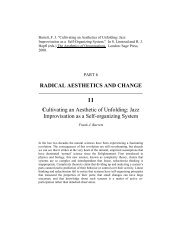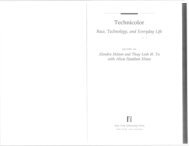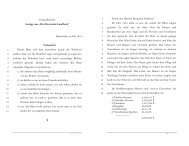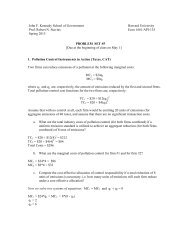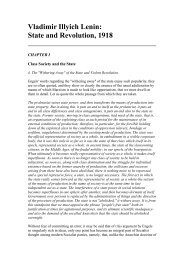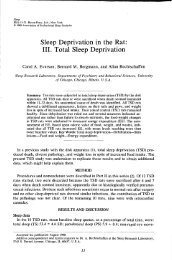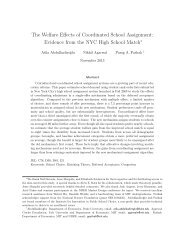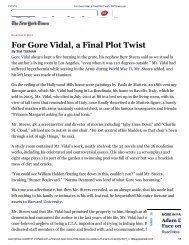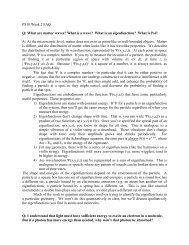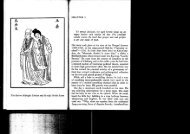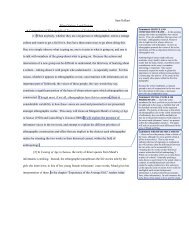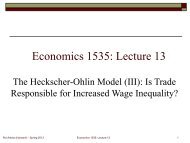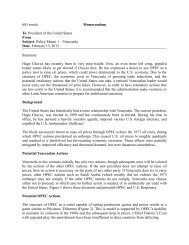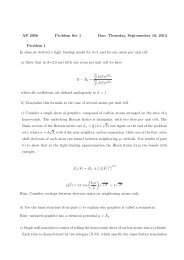CUisis AuthoU(s): ReinhaUt Koselleck and Michaela W ... - iSites
CUisis AuthoU(s): ReinhaUt Koselleck and Michaela W ... - iSites
CUisis AuthoU(s): ReinhaUt Koselleck and Michaela W ... - iSites
You also want an ePaper? Increase the reach of your titles
YUMPU automatically turns print PDFs into web optimized ePapers that Google loves.
<strong>Koselleck</strong> + Crisis<br />
have to present ourselves. Until that crisis ensues, I must live."93 And Mol-<br />
tke, to cite someone loyal to the state, used the term "crisis" again <strong>and</strong><br />
again to diagnose internal <strong>and</strong> external turning points in the course of the<br />
(1848) Revolution.94<br />
To explain the coup d'&tat of Napoleon III historically, Constantin<br />
Frantz uses a concept of crisis that encompassed all previous temporal di-<br />
mensions. He depicts the thirty-five years prior to the coup "as a never-<br />
ending cycle of ministerial crisis upon ministerial crisis."95 Avoiding super-<br />
natural or demonizing versions of the concept, he describes the 1848 Revo-<br />
lution instead in "physiological" terms as "having been merely a crisis of an<br />
illness in the nation's life, the source of which can be clearly recognized."96<br />
Moreover the coup itself was the inevitable consequence of an acute "cri-<br />
sis."97 As for the questionable figure of the new Napoleon, Frantz predicted:<br />
"France will remain in a state of crisis until there is no longer a divorce<br />
between what turns truth into reality <strong>and</strong> what reveals the falsity of lies.<br />
That is the solution, or else none exists."98 To Frantz, the origins of this<br />
permanent crisis lay in the discrepancy between a changing social structure<br />
<strong>and</strong> forms of government (Herrschaftsformen). Unable to adapt to the new<br />
structure of society, all these governments had lost their legitimacy. The<br />
only possible way out of this dilemma was a dictatorship-provided that it<br />
could succeed in representing itself as the product of the popular will.99<br />
Once "crisis" had become a commonly employed expression, its use<br />
became an indicator of both the intensity of a crisis <strong>and</strong> the perception of it<br />
as such. The frequent changes of chancellors after Bismarck's fall, rapidly<br />
led to an inflationary use of the term "Chancellor crisis," the sources of<br />
Kapp to his father, 5 July, 1848, printed in his Vom radikalen Frhbsozialismus<br />
des Vormirz zum liberalen Parteipolitiker des Bismarckreiches. Briefe 1843-1884. ed.<br />
Hans-Ulrich Wehler (Frankfurt a.M., 1969), 55.<br />
94 Helmut von Moltke to his mother, 8.3. 1848 ; also letter to his brother Adolf,<br />
11.17.1848; letter to his brother Ludwig, 3.21.1850; in Gesammelte Schriften und Denkwiirdigkeiten,<br />
vol. 4 (Berlin, 1891), 122, 129, 142.<br />
95 Constantin Frantz, Louis Napoleon (1852), reprint of the 1933 edition (Darmstadt,<br />
1960), 34.<br />
96 Ibid., 54<br />
97 Ibid., 16<br />
98 Ibid., 76<br />
" Already in 1850 Romieu used a similarly polysemic concept of "crise" to dem<strong>and</strong> a<br />
dictatorship. His premise was "that the nineteenth century will not see the foundation of<br />
anything permanent." Auguste Romieu, Der Cdisarismus oder die Notwendingkeit der<br />
Sdbelherrschaft, dargetan durch geschichtliche Beispiele von den Zeiten der Casaren bis<br />
aufdie Gegenwart (1850), German translation of the 2nd French edition (Weimar, 1851),<br />
7, 47, 59, 79.<br />
93 Friedrich<br />
383



